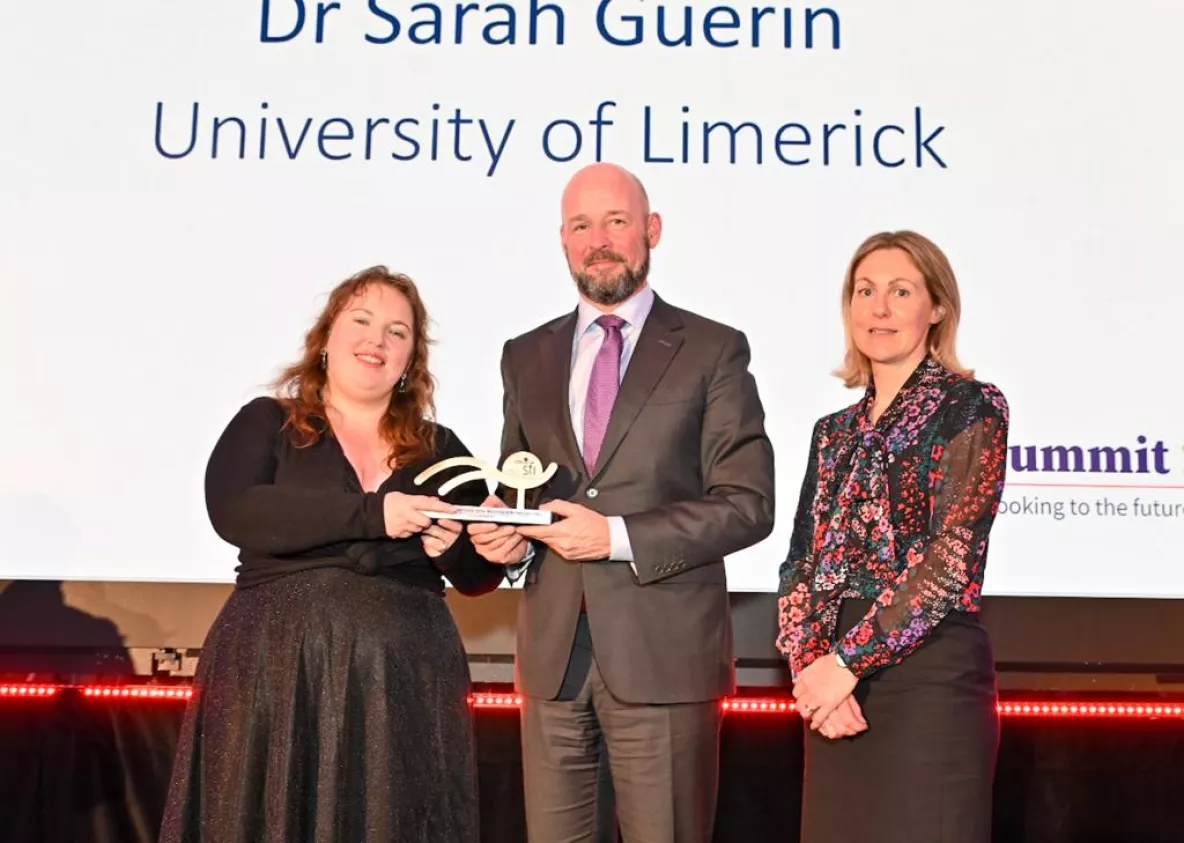
A lecturer and researcher at University of Limerick has won the award for Science Foundation Ireland Early Career Researcher of the Year for 2023, it has been announced.
Dr Sarah Guerin, a lecturer in the Department of Physics and a member of the SSPC, the SFI Research Centre based at UL, was recognised for her outstanding research at the awards.
Dr Guerin’s research focuses on modelling and growing crystals for use in areas such as eco-friendly sensing and pharmaceuticals and has led to significant breakthroughs with potential for use in medical implants and drug delivery devices.
The UL researcher was presented with the award by Professor Philip Nolan, Director General, Science Foundation Ireland, with UL Vice President Research Professor Norelee Kennedy in attendance at the awards, which took place this Monday at the Research Summit in Cork, a joint Summit hosted by SFI and the Irish Research Council.
“It’s such a huge honour to receive this award at his point in my career,” Dr Guerin explained.
“As a young research team I hope this award will drive myself and the amazing postgraduate and postdoctoral researchers on my team to reach new heights in the rational design of molecular crystals, and to create real impact for the Irish people in both eco-friendly sensing technologies and novel pharmaceutical formulations.
“This could not have happened without the endless support of my team in the Actuate Lab, my collaborators, funders, industry partners, the SSPC research centre, and the University of Limerick.
“I hope that this award will position us here in UL’s Physics Department as disruptive researchers in how we power the world around us,” Dr Guerin added.
Professor Nolan congratulated the winners of a broad range of categories honouring research excellence.
“Through their innovation, creativity and tireless work, these researchers have striven to improve the world around them. SFI is delighted to recognise their efforts and achievements with these prestigious accolades. I want to offer my sincere congratulations to all the award recipients.”
Dr Guerin spent 2022 building her multidisciplinary research group, the Actuate Lab in the Department of Physics at UL. She currently supervises three PhD students, two postdoctoral researchers, and six undergraduate final year project students.
She established a piezoelectricity summer research programme in the Department of Physics which saw four further undergraduate students undertake active research under her supervision this year. Her group members have already received multiple acknowledgements such as placing in the British Association of Crystal Growth Research Image Competition and the European Crystallography Meeting’s Science Slam.
Her mentoring began in September 2017 with the co-supervision and design of a BSc. Applied Physics undergraduate research project. This work led to the article Racemic Amino Acid Piezoelectric Transducer in Physical Review Letters and also led to a successful Irish Research Council PhD application for the student.
In 2021, she began collaborating with Prof. Vikram Pakrashi in University College Dublin to validate the first flexible amino acid sensor for pipe damage detection.
The work gained international attention and was an Influential Paper for 2021 in Cell Reports Physical Science. She currently works with a large number of international research groups as a world-leader in computationally predicting the electromechanical properties of novel molecular crystals, including groups in IISER Pune, IISER Bhopal, IISER Kolkata, Tel-Aviv University, NYU Abu Dhabi, Universiti Malaysia Sabah, Zhejiang University and Aliah University.
She has also previously worked with groups in Singapore and Switzerland, and her research has been cited across five continents. Her research collaborations have been featured on the cover of JACS, CrystEngComm, the Journal of Materials Chemistry B, and Accounts of Material Research.
One of her proudest achievements has been incorporating predictive design into the global field of crystal design and beyond, via establishing an extensive international network of world-leading collaborators that allows her to maximise the impact of her models. This has led to the rationalisation and design of complex crystal phenomena such as bending, twisting, photosalience, and self-healing.
Nationally she has collaborated and published with researchers across five higher education institutes and three SFI research centres.